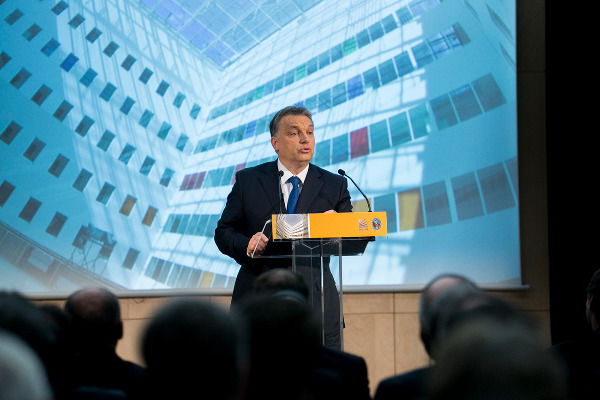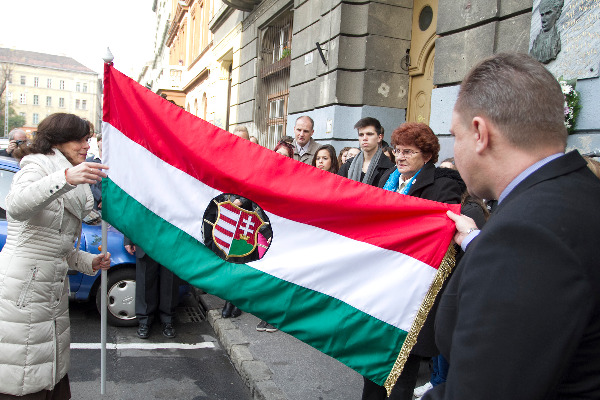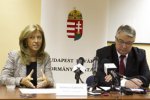| |
|
|
 |
Fidesz Prepares for the European Elections
|
Last week, Fidesz - Hungarian Civic Union presented its European elections list, ahead of all other political parties in Hungary. First on the list is MEP Pál Schmitt, former vice-chairman of Fidesz. The main message of the party's campaign is "Hungary Can Do More". |
Created: 28th January, 2009 10:55 | Last updated: 28th January, 2009 11:54 |
 print print
|
 send send
|
|
|
|

Mr Schmitt is followed on the list by two other incumbent MEPs, Mr József Szájer, vice-president of the European People's Party's (EPP) European Parliament Group and Ms Kinga Gál. Mr Schmitt said the European elections' stakes were "very high" as "they could be regarded as a base" for a victory at the national elections. The party's election manifesto will be presented in May, following a series of conferences and roundtable discussions concentrating on issues such as economic growth, energy policy and environmental protection, agricultural policy and rural development as well as demographic questions and national identity.
Former minister of foreign affairs Mr János Martonyi declared "Hungary's past five years have been those of divergence: we fell further and further away from Europe's economic development, political culture and values. The program of Fidesz is a program of convergence, of catching up and real change."
In his speech, chairman of Fidesz Viktor Orbán said Hungary needed the regime change some twenty years ago to give back to the people their freedom and independence. "We have to fight for Hungary again, just as in 1989. Fidesz and all centre-right politicians must prove that we are ready to fight for the Hungarians", he added. Mr Orbán emphasized that MEPs of Fidesz will have to help Hungary establish better positions in Europe and get out of the current crisis. "The aim of the democratic transition, which was to place Hungary in the heart of Europe, not its periphery, remains the same", ended his speech Mr Orbán.
The week after the conference, Mr Orbán travelled to Germany and Austria: he met with government representatives in Thuringia and gave a speech at the Euromoney conference in Vienna.
"Hungary's interest is to build a strong Central European cooperation that stretches from Poland all the way to Croatia", said Mr Orbán in his lecture on the questions and the future of European security policy in Thuringia, Germany, at the invitation of the state's Christian Democrat government. "It is unacceptable that millions of people are left without gas because of a debate between Russia and the Ukraine", added the chairman of Fidesz at a press conference following his exposé, referring to the gas crisis and its consequences in Central Europe. "I can't tell you which of the two countries is right but as a politician coming from Central Europe, I can remind you that in 1956, the Russians said they were moving out of Hungary while at the same time they were in fact invading us", he said. Mr Orbán also emphasized that a sophisticated and well-elaborated cooperation has to be built with Russia, defining the areas where we are allies, where we compete with each other and where we are rivals with one another.
In his lecture in the capital of Austria, Vienna, at the annual Euromoney Conference, Mr Orbán called for a "new strategic alliance in Central Europe". He talked of the need of taking Russia seriously, deeming "dangerous" those Western European attempts that aim at establishing a strategic partnership between the European Union and Moscow. "Quite the opposite: the trans-Atlantic alliance and Europe need to be strengthened and a very balanced, sophisticated foreign policy vis-à-vis Russia has to be elaborated", emphasized the former Prime Minister of Hungary.
Referring to the gas-crisis and Russia's policy, Mr Orbán said Moscow was not only seeking to get the highest possible price on the market for its exported natural gas - which was, indeed, a legitimate demand - but also monopolize the region's gas industry. "For reasons of geopolitics, Central Europe has a different attitude towards Russia than Western Europe has", emphasized Mr Orbán, adding that Central and Eastern European countries will have to form a new strategic alliance that will step up as an independent international player vis-à-vis Russia.
Both in Thuringia, Germany and Austria, Mr Orbán emphasized that in terms of domestic policy, only major and radical tax-cuts could solve the current economic crisis whereas for the future of a common European energy policy, the chairman of Fidesz said the only way to ease dependence on Russian gas exportations was to back the Nabucco pipeline project.
(www.fidesz.hu, www.orbanviktor.hu)
|
 |
|
Jelenleg nincs információ
Tartsa a kurzort egy dátum fölé az aznapi programok- ért. Kattintson egy napra a részletekért.
Jelenleg nincs erre a napra vonatkozó információ
Keresse meg irányítószám alapján az Önhöz legközelebb működő választókerületi irodát!
|
|
 több
több


 több
több
 Az MTA Természettudományi Kutatóközpont új épületének átadása
Az MTA Természettudományi Kutatóközpont új épületének átadása
 Megemlékezés Gérecz Attilára
Megemlékezés Gérecz Attilára
 több
több
 több
több




























